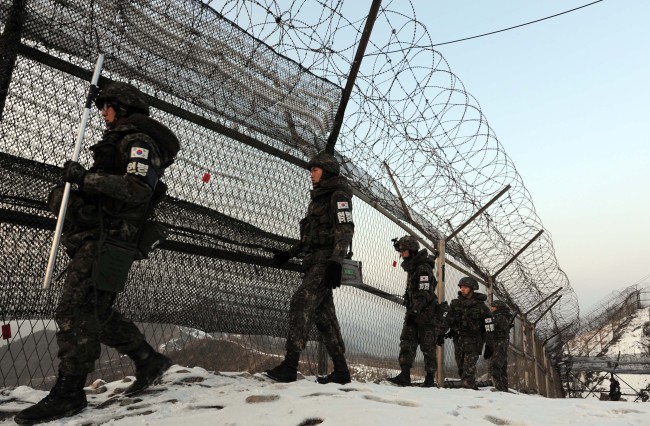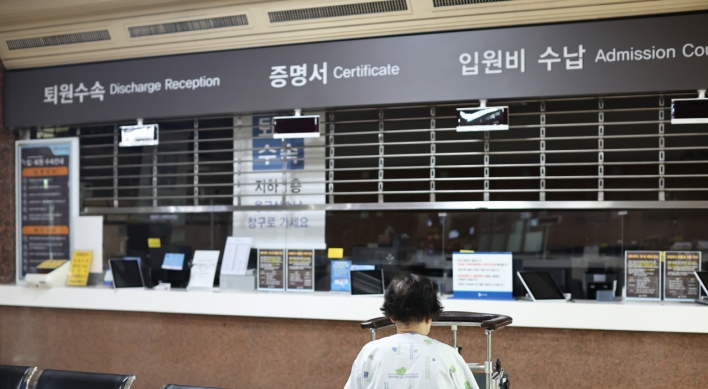N. Korea pulls plug on military hotline, closes border office
Seoul says N.K. action still does not affect operation of S. Korean factories in Gaeseong
By Shin Hyon-heePublished : March 27, 2013 - 20:47
North Korea on Wednesday severed its military hotline with the South and closed a communication office near the border in protest against recent U.N. sanctions, ongoing Seoul-Washington military drills and their other “hostile” acts.
The South’s Unification Ministry immediately urged Pyongyang to retract the decision, which it said will hamper smooth operation of the Gaeseong Industrial Complex by complicating its workers’ entrance and exit.
“Increasing U.S. nuclear threats against us and a frantic fratricidal ruckus by South Korea that colluded in imposing sanctions have reached an extremely reckless level impairing the country’s highest dignity,” unnamed North Korean chief of inter-Korean military talks said in a statement carried by the official Korean Central News Agency.
“Due to the enemies’ rash activities, the military communication line opened for inter-Korean dialogue and cooperation has already lost its meaning.”
Seoul officials said they activated a round-the-clock emergency contact system at the industrial complex to ensure the safety of South Koreans there.
The two sides have used the military line as a key method to earn approval for the entry and exit of South Korean workers. Other outlets remain intact such as the Gaeseong Industrial Complex Management Committee and the one used for air control handover.
The South’s Unification Ministry immediately urged Pyongyang to retract the decision, which it said will hamper smooth operation of the Gaeseong Industrial Complex by complicating its workers’ entrance and exit.
“Increasing U.S. nuclear threats against us and a frantic fratricidal ruckus by South Korea that colluded in imposing sanctions have reached an extremely reckless level impairing the country’s highest dignity,” unnamed North Korean chief of inter-Korean military talks said in a statement carried by the official Korean Central News Agency.
“Due to the enemies’ rash activities, the military communication line opened for inter-Korean dialogue and cooperation has already lost its meaning.”
Seoul officials said they activated a round-the-clock emergency contact system at the industrial complex to ensure the safety of South Koreans there.
The two sides have used the military line as a key method to earn approval for the entry and exit of South Korean workers. Other outlets remain intact such as the Gaeseong Industrial Complex Management Committee and the one used for air control handover.

Officials and employees entered and departed normally even after the decision was delivered to the South via phone at about 11:20 a.m., they said.
“We urge immediate withdrawal of the measure that is not helpful for the stable operation of the Gaeseong Industrial Complex,” a Unification Ministry official told reporters on condition of anonymity due to the sensitivity of the issue.
But he cautioned against linking the decision directly to any halt or decrease in production activities.
“Severing the hotline does not amount to blocking the entry to the complex, but it will obviously cause inconvenience because we will have to resort to other, more complex channels.”
The notice arrived amid heightened tension across the border from North Korea’s constant saber-rattling since the U.N. Security Council passed its fourth round of stifling sanctions early this month in response to its February nuclear test and South Korea and the U.S. began their annual military exercises last month.
It has declared its exit from the 1953 armistice and threatened to launch “diversified precision nuclear strikes” and attack South Korean border islands.
Early in the day, the South Korean military was on a highest alert after a frontline solder found a strange object at 2:30 a.m. in the hugely fortified border with North Korea and hurled a grenade.
Seven hours later, the “Jindogae 1” alert was lifted after it turned out that what he confronted near his guard post in Hwacheon, Gangwon Province, was apparently an elk or some other wild animal. No signs of intrusion were found.
Pyongyang further stepped up its threat by openly proclaiming to the Security Council that it faces a “nuclear war situation” provoked by Seoul and Washington.
It blasted the allies’ ongoing Key Resolve and Foal Eagle drills involving U.S. B-52 nuclear-capable bombers and their new contingency plans to better counter North Korean provocations.
“Our military and people are entering the final phase of the all-out, anti-U.S. showdown to protect the nation’s sovereignty and the people’s dignity by fully engaging our military-first force,” the North’s Foreign Ministry said in a statement.
“Now a nuclear war on the peninsula has a realistic meaning, not an ideational one.”
The North’s state media said Tuesday the regime has put its military and artillery units into the “No. 1 combat-ready posture” for attacks on the South, U.S. mainland and Pacific bases such as Hawaii and Guam.
In a follow-up threat, the Rodong Sinmun run by the ruling Workers’ Party said Wednesday its practical military action will “include our powerful sovereignty-protecting preemptive nuclear attack.”
“The U.S. mainland, South Korea and U.S. military bases in the vicinity of the peninsula are all in our military’s target range,” it said, adding that all its weapons including atomic bombs are designed to be fired with the push of a button.
While keeping close tabs on movements in the North, the allies dismissed the continuing threats and urged the regime to refrain from escalating tensions.
“North Korea’s bellicose rhetoric and threats follow a pattern designed to raise tensions and intimidate others,” U.S. State Department acting deputy spokesman Patrick Ventrell said Tuesday in Washington.
“The U.S. is fully capable of defending itself and our allies against the (North Korean) attack, and we’re firmly committed to the defense of the Republic of Korea and Japan.”
China’s Foreign Ministry spokesperson Hong Lei called for calm behavior on all sides. “We hope that relevant parties will exercise restraint so as to ease the tension,” he told a briefing on Tuesday.
In a separate development, Pyongyang announced earlier in the day that the ruling Workers’ Party’s Central Committee will hold a plenary meeting at the end of this month to “discuss and decide on a critical issue to accomplish a decisive changeover in carrying out the Juche revolution.”
The official media did not elaborate on the agenda but the top party meeting has chiefly dealt with a personnel reshuffle, macroeconomic measures and other major policies.
By Shin Hyon-hee (heeshin@heraldcorp.com)




![[AtoZ Korean Mind] Does your job define who you are? Should it?](http://res.heraldm.com/phpwas/restmb_idxmake.php?idx=644&simg=/content/image/2024/05/06/20240506050099_0.jpg&u=)













